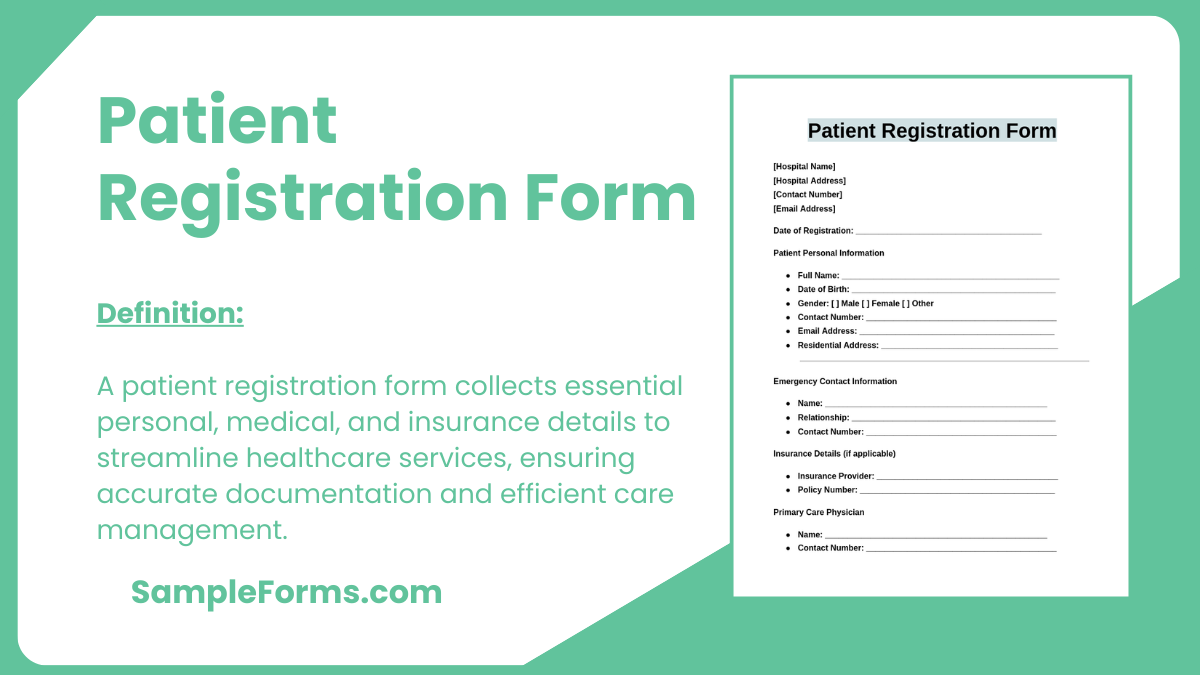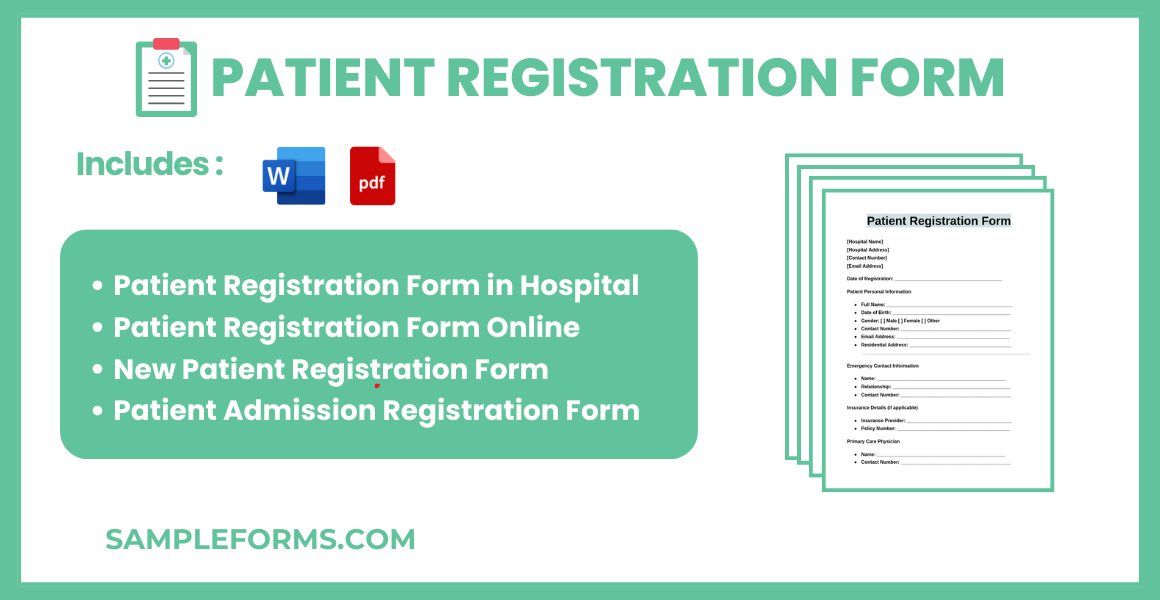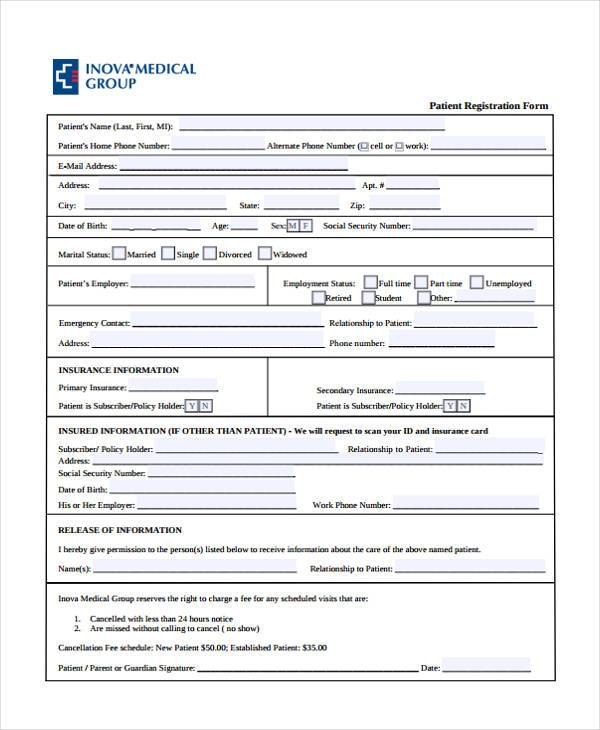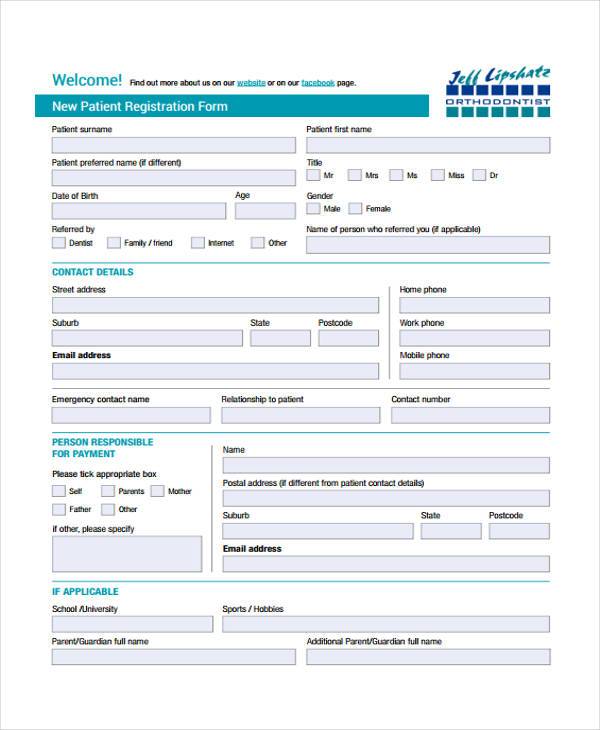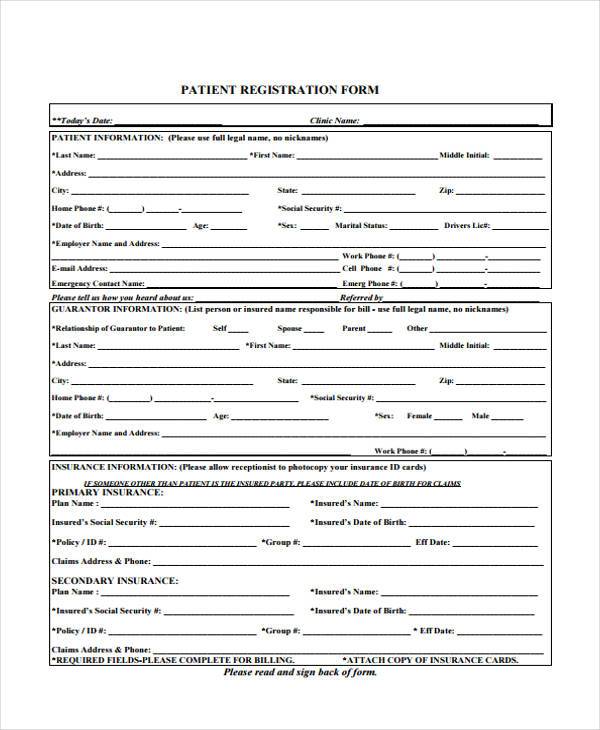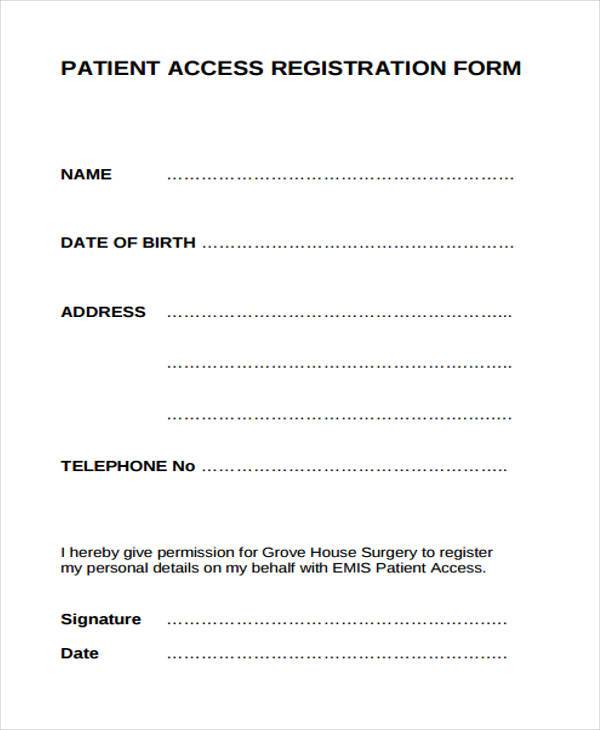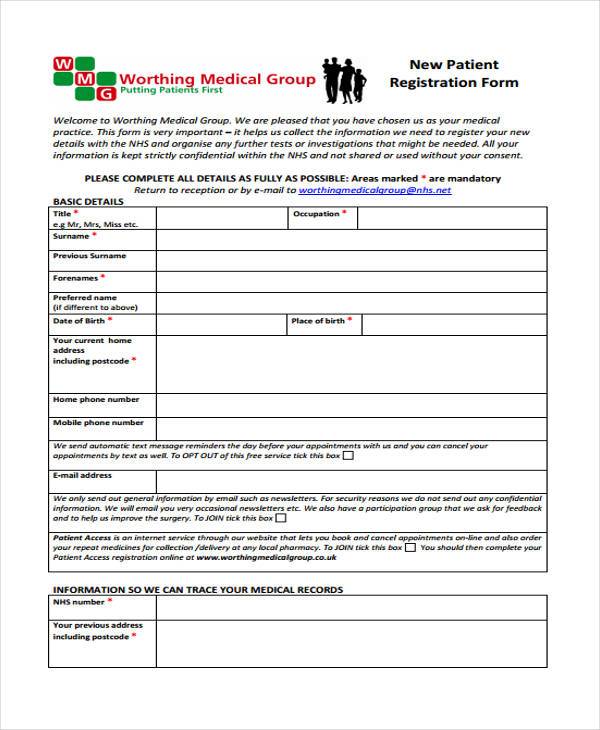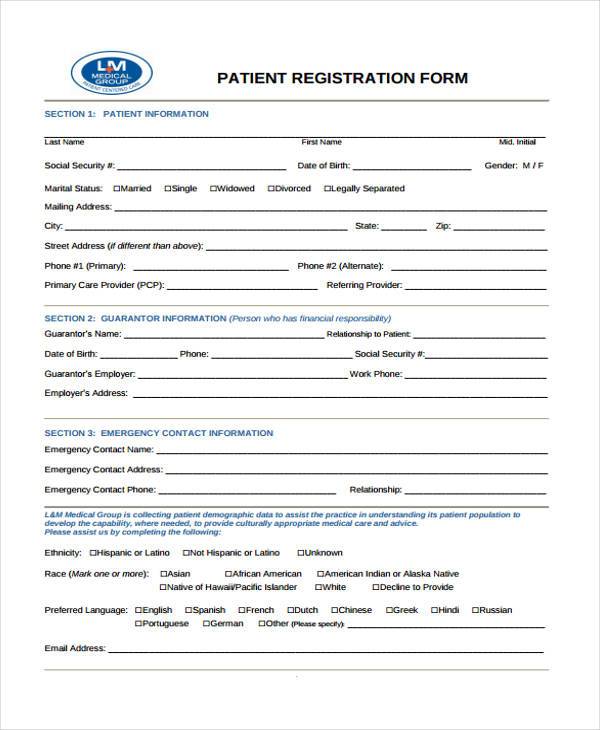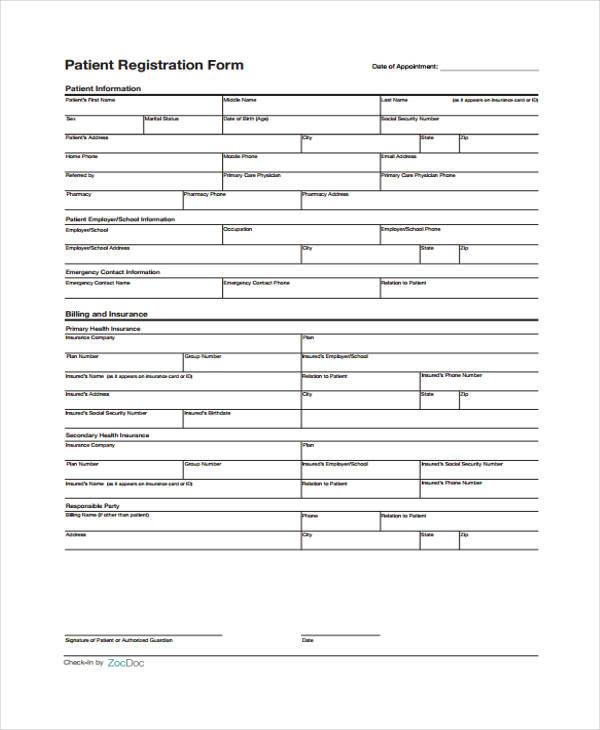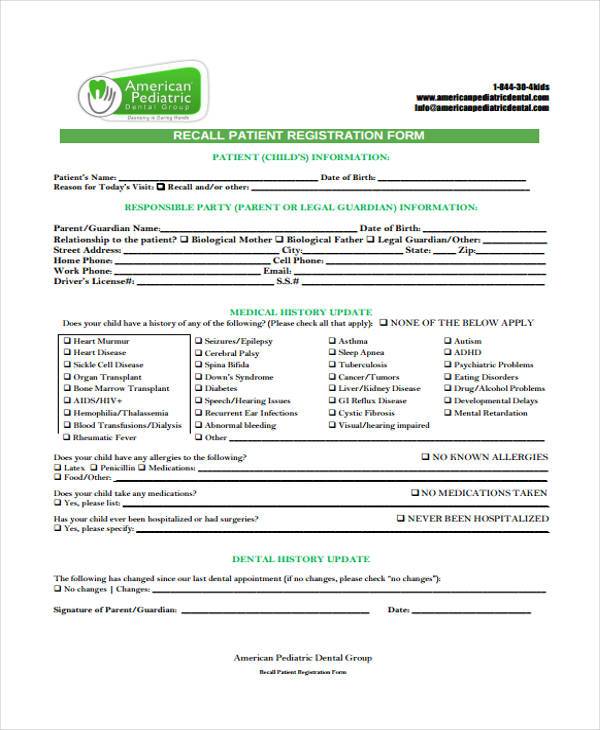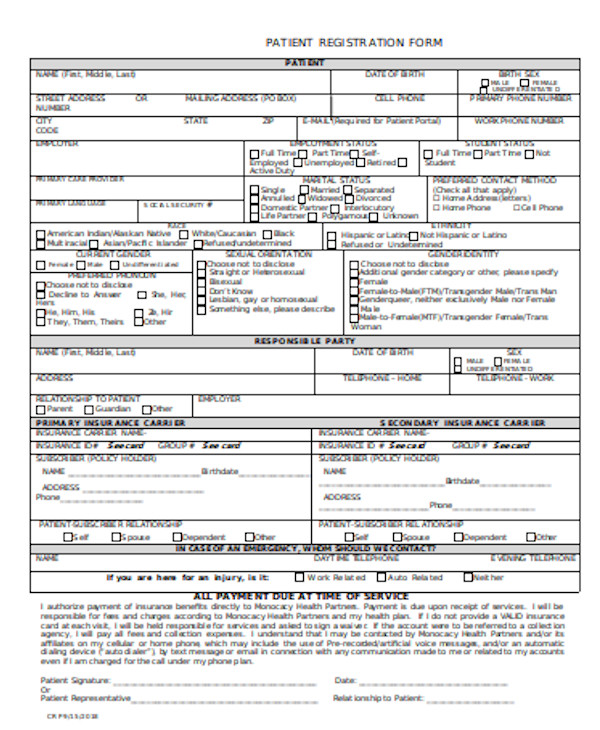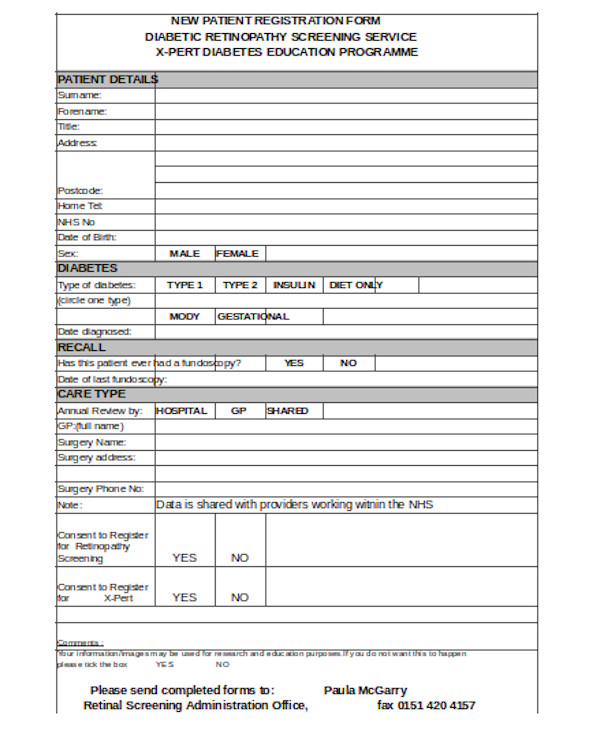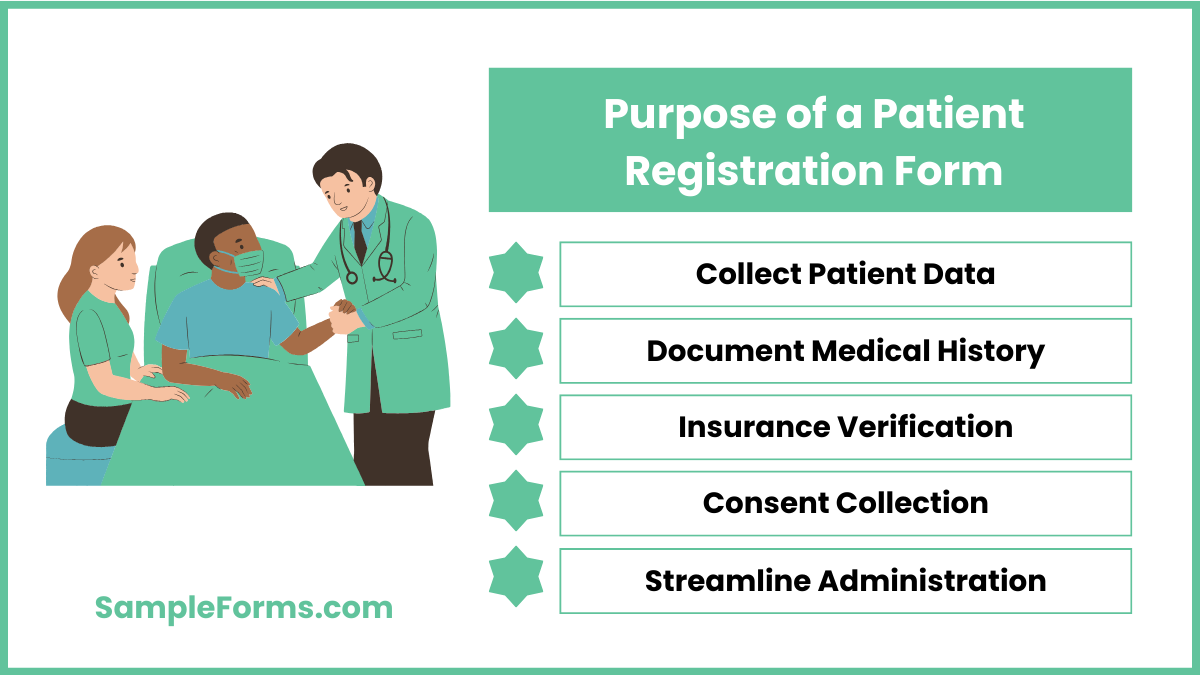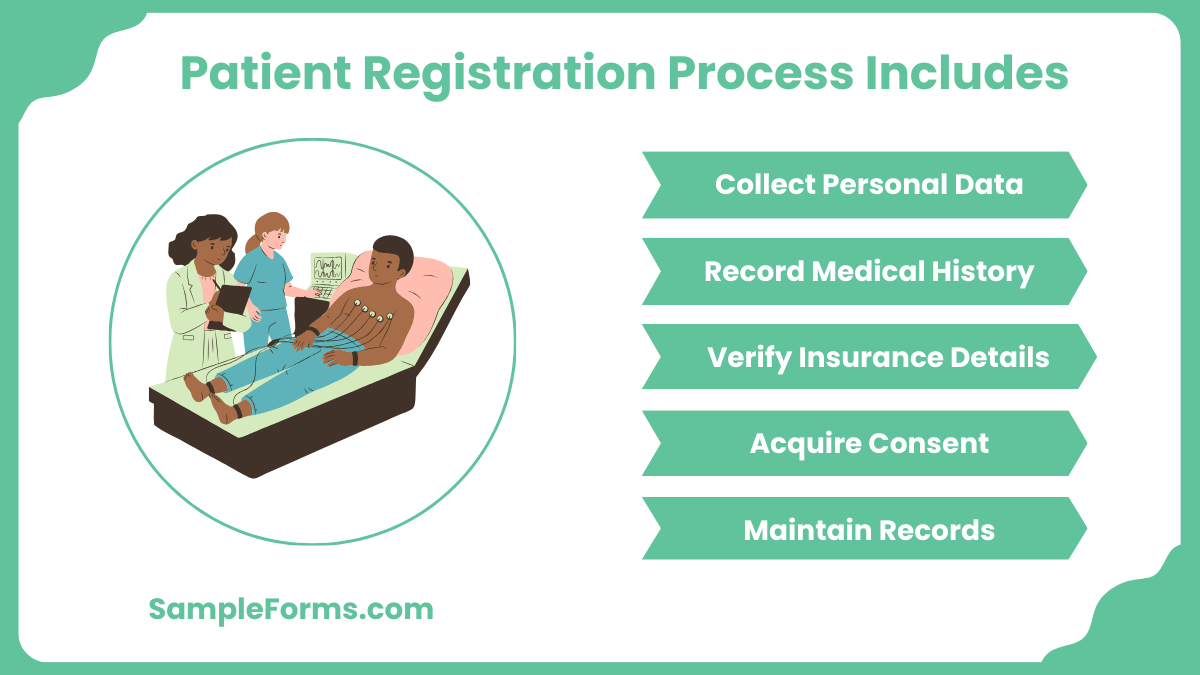A patient registration form is essential for collecting accurate information during healthcare onboarding. This Registration Form ensures medical providers have detailed personal, medical, and insurance data. In this complete guide, we cover the importance of a well-structured Patient Form to streamline administrative processes and ensure compliance with healthcare regulations. Learn how to create forms that cater to specific needs, maintain confidentiality, and enhance patient experience. With practical examples and tips, this guide will help clinics and hospitals improve their registration systems, making them efficient and patient-friendly.
Download Patient Registration Form Bundle
What is Patient Registration Form?
A patient registration form is a document used by healthcare facilities to collect essential details about patients. This includes personal information, medical history, and insurance details. The form serves as the first step in providing medical care, ensuring accurate record-keeping and smooth communication. It also aids in compliance with legal and administrative requirements while protecting patient confidentiality.
Patient Registration Format
[Healthcare Provider Name]
[Healthcare Address]
[Contact Number]
Patient Information
- Full Name: ________________________________________________
- Date of Birth: _____________________________________________
- Gender: [ ] Male [ ] Female [ ] Other
- Contact Number: __________________________________________
- Email Address: ___________________________________________
- Residential Address: _______________________________________
Emergency Contact
- Name: _________________________________________________
- Relationship: _____________________________________________
- Phone Number: __________________________________________
Insurance Information
- Insurance Provider: ________________________________________
- Policy Number: ___________________________________________
Medical History
- Known Allergies: __________________________________________
- Existing Conditions: _______________________________________
- Current Medications: ______________________________________
Signature of Patient or Guardian: ___________________________
Date: _________________________________________________
Patient Registration Form in Hospital
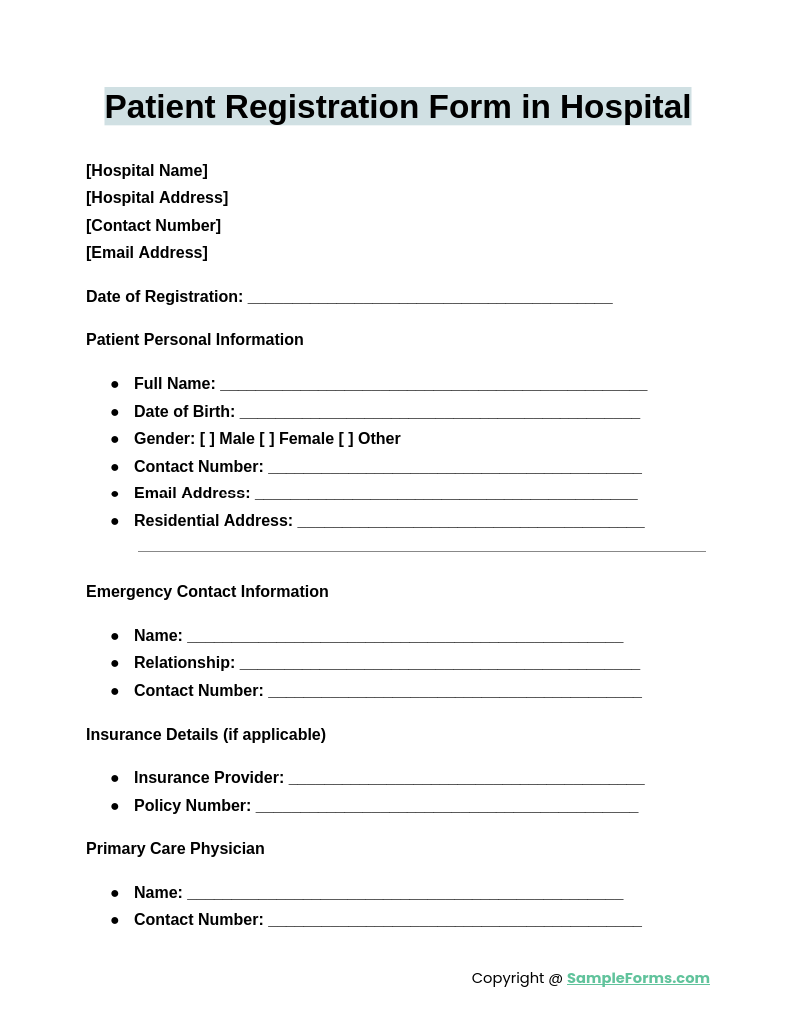
A patient registration form in a hospital is used to collect patient details, including medical history, emergency contacts, and insurance information. It ensures efficient admissions, accurate record-keeping, and seamless billing, much like a Pharmacist Registration Form in healthcare settings.
Patient Registration Form Online
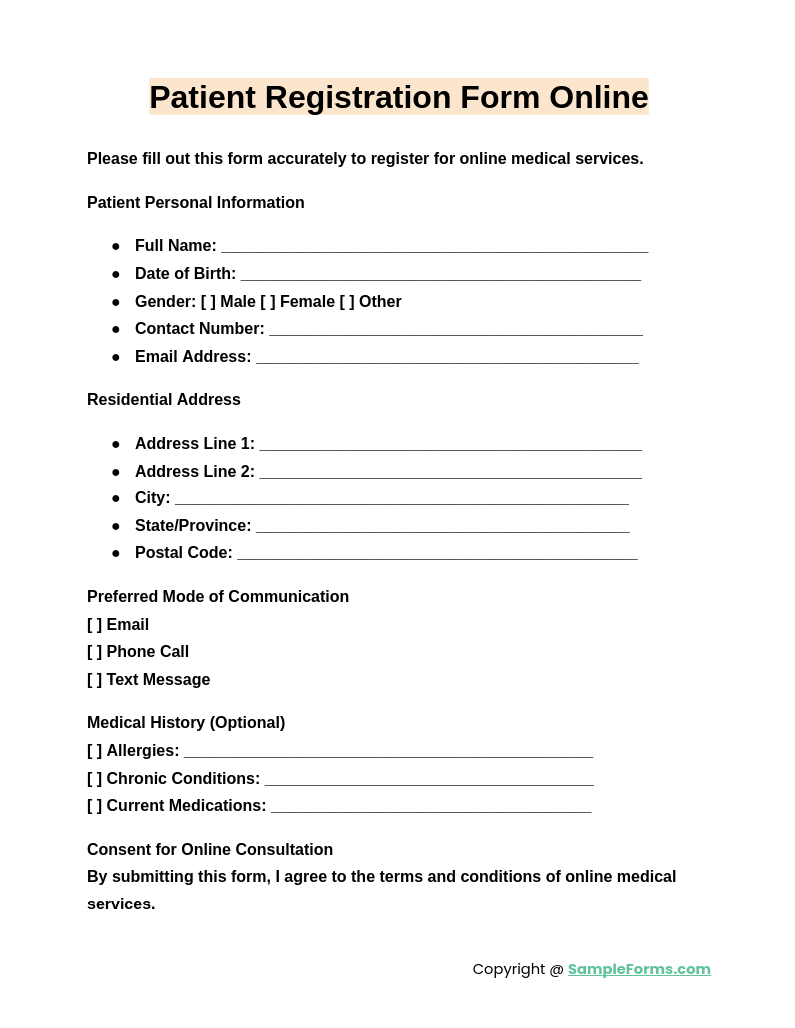
An online patient registration form simplifies the healthcare onboarding process. Patients submit personal and medical details digitally, saving time and reducing paperwork, similar to how a TIN Registration Form digitizes tax-related tasks for efficiency.
New Patient Registration Form
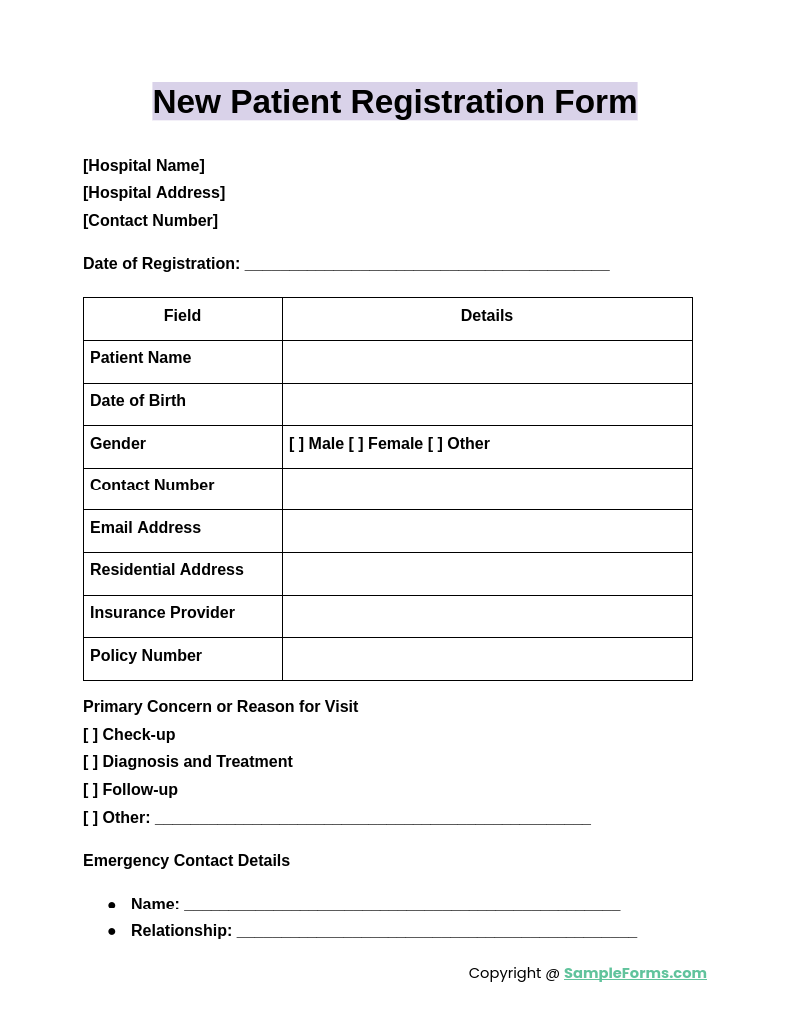
A new patient registration form captures essential information for first-time visitors, including demographics, allergies, and existing conditions. This helps medical professionals provide personalized care, much like a Conference Registration Form organizes attendee details.
Patient Admission Registration Form
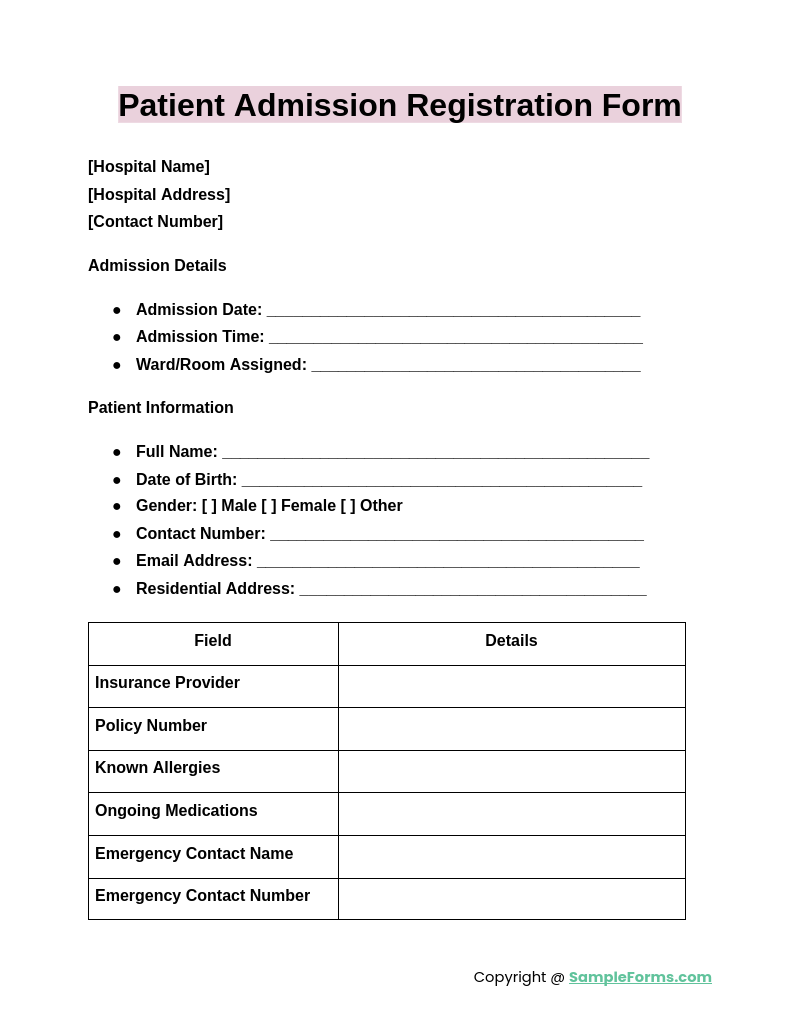
A patient admission registration form is required for hospital stays, recording comprehensive details such as diagnosis, consent, and insurance. It ensures smooth admissions, similar to the structure of a Contest Registration Form for organized entries.
Browse More Patient Registration Forms
Sample Medical Patient Registration Form
Sample Dental Patient Registration Form
Free Patient Registration Form
Patient Access Registration Form
New Patient Registration Form Sample
Patient Registration Form Example
Printable Patient Registration Form
Recall Patient Registration Form
Simple Patient Registration Form
New Patient Registration Form
What is the purpose of a patient registration form?
The purpose of a patient registration form is to gather essential personal, medical, and insurance information for accurate healthcare delivery and record-keeping.
- Collect Patient Data: Obtain personal details like name, address, and contact information for identification and communication purposes.
- Document Medical History: Record past illnesses, surgeries, allergies, and ongoing medications for informed decision-making.
- Insurance Verification: Ensure accurate billing by documenting insurance provider details and coverage terms.
- Consent Collection: Acquire patient consent for treatments, privacy policies, and legal documentation.
- Streamline Administration: Simplify admission and appointment processes, akin to a Youth Group Registration Form for event management.
What information is found on the patient registration form?
A patient registration form includes essential data for healthcare providers to deliver accurate care and maintain comprehensive patient records.
- Personal Information: Full name, address, contact details, and emergency contact numbers for identification and emergencies.
- Medical History: Details of chronic conditions, allergies, and prior treatments for clinical accuracy.
- Insurance Details: Provider name, policy number, and coverage details for billing purposes.
- Consent and Legal Agreements: Patient signatures for consent to treatment and acknowledgment of policies.
- Additional Demographics: Other details, such as occupation, similar to a Farmer Registration Form, for specific profiling.
Why is it important for the information during patient registration to be accurate?
Accurate information in a patient registration form ensures effective treatment, avoids errors, and supports compliance with healthcare standards.
- Prevents Misdiagnosis: Correct data helps avoid treatment errors caused by incomplete or inaccurate medical history.
- Improves Communication: Accurate contact details ensure timely communication between patients and providers.
- Ensures Legal Compliance: Precise data supports adherence to healthcare regulations, similar to a Nursing Registration Form for nursing professionals.
- Streamlines Billing: Accurate insurance and billing details prevent claim denials and financial discrepancies.
- Enhances Patient Safety: Reliable records reduce risks of adverse reactions and complications.
How do I create a patient registration form?
Creating a patient registration form requires clear design, essential fields, and compliance with privacy laws for effective healthcare data collection.
- Define Necessary Fields: Include sections for personal details, medical history, and insurance information.
- Use Simple Language: Design user-friendly forms that patients can complete without confusion.
- Ensure Compliance: Follow healthcare regulations like HIPAA for privacy and security.
- Digitize the Form: Create an online version for accessibility, similar to a Job Registration Form for streamlined submissions.
- Test for Accuracy: Review the form for missing fields and usability before implementation.
What does the patient registration process include?
The patient registration process involves collecting, verifying, and recording data to ensure seamless onboarding and effective healthcare delivery.
- Collect Personal Data: Gather names, contact details, and demographics to build the patient profile.
- Record Medical History: Obtain past and current health conditions for a comprehensive understanding.
- Verify Insurance Details: Ensure active policies are in place for billing purposes.
- Acquire Consent: Secure signatures for legal and treatment-related agreements, similar to a Talent Show Registration Form for formal approval.
- Maintain Records: Organize and store data securely for future reference and compliance.
What is a patient registration system?
A patient registration system streamlines data collection for admissions and appointments, similar to a Camp Registration Form in managing participant details efficiently.
What is the most common complaint heard from patients?
The most common patient complaint involves long wait times, emphasizing the need for efficient processes akin to a Course Registration Form setup.
What does a patient registration representative do?
A patient registration representative collects and verifies patient information, ensuring accuracy and efficiency, much like a Gym Registration Form process for member onboarding.
What are the most common complaints heard from patients?
Frequent patient complaints include miscommunication, long waits, and billing errors, echoing the challenges seen in Summer Camp Registration Form management.
What patient right is most often violated?
Confidentiality breaches are the most common patient rights violations, paralleling concerns in sensitive contexts like a Hotel Registration Form process.
What is the role of a registered nurse in patient care?
A registered nurse provides direct care, monitors patient conditions, and ensures proper treatment, similar to a Business Registration Form facilitating organized operations.
What does the patient registration record consist of?
A patient registration record includes personal details, medical history, and insurance information, akin to a structured Hospital Registration Form.
How do you describe patient registration on a resume?
Highlight skills in data collection, verification, and administrative efficiency, similar to organizing a Hotel Guest Registration Form process.
Why is it important to verify patient information?
Verifying patient information ensures safety, accurate treatment, and compliance, much like confirming details in a Company Registration Form.
Can hospitals tell you if a patient is there?
Hospitals confirm patient presence under strict privacy laws, balancing transparency and confidentiality, much like managing a Conference Registration Form attendee list.
The Patient Registration Form is an indispensable tool for healthcare providers. A comprehensive patient form ensures accurate patient records, streamlines administrative tasks, and enhances medical care delivery. Whether it’s for initial consultations or long-term treatment plans, a well-structured registration form is critical. Use these insights to improve Patient Intake Form onboarding, ensure compliance, and provide seamless healthcare experiences.
Related Posts
-
FREE 9+ Volunteer Sign On – Sign Off Sheet Forms in PDF | MS Word
-
Vendor Registration Form
-
Hotel Guest Registration Form
-
Church Registration Form
-
Summer Camp Registration Form
-
FREE 9+ Copyright Registration Forms in PDF
-
Hospital Registration Form
-
FREE 11+ Basketball Registration Forms in PDF | MS Word | Excel
-
FREE 9+ Event Vendor Registration Forms in PDF | MS Word
-
FREE 10+ Registration Request Forms in PDF | MS Word
-
Daycare Registration Form
-
What Is a Competition Entry Registration Form? [ with Samples ]
-
Visitor Sign In-Out Sheet
-
Sign In – Sign Up Sheet
-
Employee Sign-In Sheet
